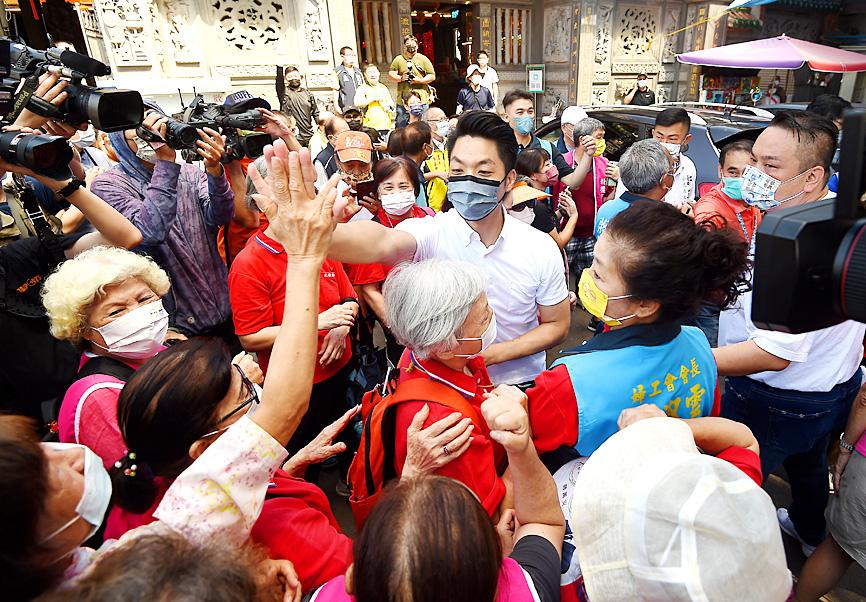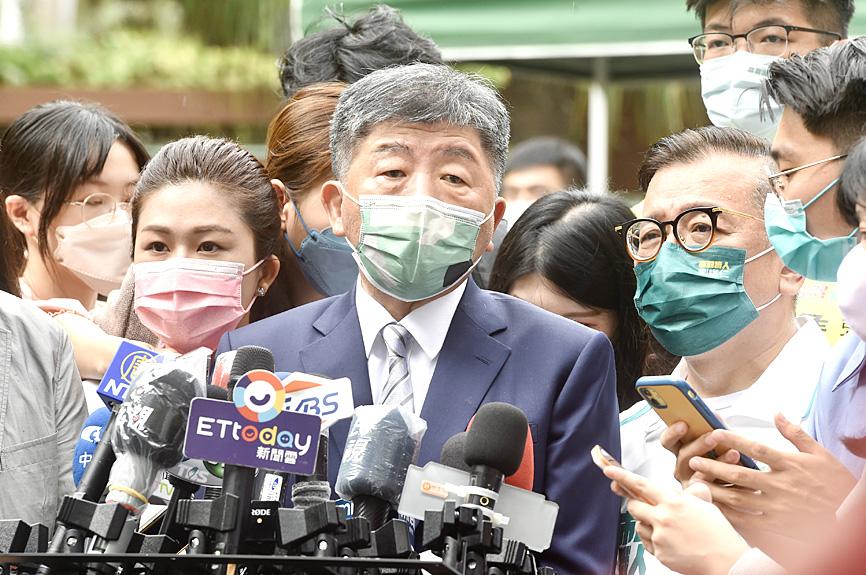Chinese Nationalist Party (KMT) Legislator Chiang Wan-an (蔣萬安) has pledged to launch a bus reservation system if he is elected Taipei mayor, but his critics said the proposal was impractical.
Chiang, the KMT’s candidate for Taipei mayor in the Nov. 26 local elections, on Friday said he has discussed with New Taipei City Mayor Hou You-yi (侯友宜) of the KMT a plan to establish a “Taipei-New Taipei City transportation committee,” which could offer new ideas on ticketing and bus services.
He said the two cities’ bus routes could be better integrated and public transportation stations’ resources could be shared.

Photo: Chu Pei-hsiung, Taipei Times
Bus services could include an online bus reservation system, allowing people with disabilities, elderly people, pregnant women, and parents with a stroller to take the bus safely and comfortably, Chiang said.
Democratic Progressive Party (DPP) Legislator Rosalia Wu (吳思瑤), who manages DPP Taipei mayoral candidate Chen Shih-chung’s (陳時中) election campaign, yesterday said Chiang’s proposal is difficult to understand.
Chiang speaks as if his “life experience is similar to that of ordinary citizens,” Wu said, urging him to explain how his plan can be executed.

Photo: George Tsorng, Taipei Times
She asked how seats on a bus full of passengers during rush hour can be reserved.
Some elderly or less privileged people could be less digitally literate, so they might not be able to reserve a bus seat online, Wu said.
Taipei Deputy Mayor Vivian Huang (黃珊珊), a potential candidate for Taipei mayor, said every candidate can put forth policy ideas, but the plans should be responsible and executable.

Photo: Lo Pei-de, Taipei Times
Taipei and New Taipei City already have joint programs, including a monthly public transportation pass, she said, adding that Taipei also has a “leaping frog” system, in which buses run through remote or mountainous areas where demand is weaker and allow passengers to make reservations.
It would be difficult for people to make reservations for metro buses, which run at shorter intervals and often carry many passengers, Huang said.
“I wonder if people should make reservations for Mass Rapid Transit trains too?” she asked.
Taiwan Statebuilding Party candidate for Taipei city councilor Wu Hsin-tai (吳欣岱) wrote on Facebook that Chiang’s proposal was “meaningless,” as metro buses might arrive at bus stations at irregular times, depending on traffic.
She asked what passengers would do if they make a bus reservation, but another bus that travels to the same destination arrives first, or if a bus arrives, but the passengers who made the reservation are not at the station, or whether a reserved seat should be left unoccupied if a passenger with a reservation does not take the bus.
Additional reporting by CNA

Taiwan has received more than US$70 million in royalties as of the end of last year from developing the F-16V jet as countries worldwide purchase or upgrade to this popular model, government and military officials said on Saturday. Taiwan funded the development of the F-16V jet and ended up the sole investor as other countries withdrew from the program. Now the F-16V is increasingly popular and countries must pay Taiwan a percentage in royalties when they purchase new F-16V aircraft or upgrade older F-16 models. The next five years are expected to be the peak for these royalties, with Taiwan potentially earning

STAY IN YOUR LANE: As the US and Israel attack Iran, the ministry has warned China not to overstep by including Taiwanese citizens in its evacuation orders The Ministry of Foreign Affairs (MOFA) yesterday rebuked a statement by China’s embassy in Israel that it would evacuate Taiwanese holders of Chinese travel documents from Israel amid the latter’s escalating conflict with Iran. Tensions have risen across the Middle East in the wake of US and Israeli airstrikes on Iran beginning Saturday. China subsequently issued an evacuation notice for its citizens. In a news release, the Chinese embassy in Israel said holders of “Taiwan compatriot permits (台胞證)” issued to Taiwanese nationals by Chinese authorities for travel to China — could register for evacuation to Egypt. In Taipei, the ministry yesterday said Taiwan

Taiwan is awaiting official notification from the US regarding the status of the Agreement on Reciprocal Trade (ART) after the US Supreme Court ruled US President Donald Trump's global tariffs unconstitutional. Speaking to reporters before a legislative hearing today, Premier Cho Jung-tai (卓榮泰) said that Taiwan's negotiation team remains focused on ensuring that the bilateral trade deal remains intact despite the legal challenge to Trump's tariff policy. "The US has pledged to notify its trade partners once the subsequent administrative and legal processes are finalized, and that certainly includes Taiwan," Cho said when asked about opposition parties’ doubts that the ART was

If China chose to invade Taiwan tomorrow, it would only have to sever three undersea fiber-optic cable clusters to cause a data blackout, Jason Hsu (許毓仁), a senior fellow at the Hudson Institute and former Chinese Nationalist Party (KMT) legislator, told a US security panel yesterday. In a Taiwan contingency, cable disruption would be one of the earliest preinvasion actions and the signal that escalation had begun, he said, adding that Taiwan’s current cable repair capabilities are insufficient. The US-China Economic and Security Review Commission (USCC) yesterday held a hearing on US-China Competition Under the Sea, with Hsu speaking on